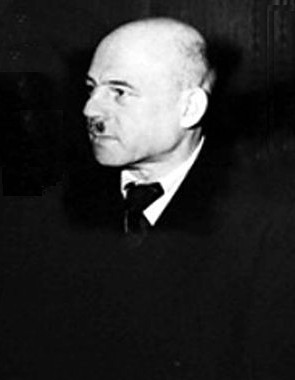- Fritz Sauckel
Infobox Officeholder
name = Fritz Sauckel
imagesize =
small
caption =
order = Reichsstatthalter of Thuringia
term_start = 1933
term_end = 1945
primeminister = HimselfWilly Marschler
predecessor = None
successor = None
order2 = Minister President of Thuringia
term_start2 = 1932
term_end2 = 1933
predecessor2 =Erwin Baum
successor2 =Willy Marschler
order3 = Gauleiter of Thuringia
term_start3 = 1927
term_end3 = 1945
leader3 =Adolf Hitler
predecessor3 =Artur Dinter
successor3 = None
order4 = General Plenipotentiary for Labour Deployment
term_start4 =March 21 ,1942
term_end4 =May 1945
predecessor4 = None
successor4 = None
birth_date =October 27 ,1894
birth_place =Haßfurt , thenKingdom of Bavaria ,German Empire
death_date =October 16 ,1946 (aged 51)
death_place =Nuremberg ,Germany
constituency =
party =NSDAP
spouse = Elisabeth Wetzel (m. 1924)
children = 10
profession =Sailor , factory owner
education =
religion =
footnotes =Ernst Friedrich Christoph "Fritz" Sauckel (
October 27 ,1894 –October 16 ,1946 ) was a Naziwar criminal , who organized the systematic enslavement of millions from lands occupied byNazi Germany . He was General Plenipotentiary for Labour Deployment from 1942 until the end of the war.Early life
He was born in
Haßfurt (Kingdom of Bavaria ), the only child of a postman and a seamstress. Sauckel was educated at local schools and left early when his mother fell ill. He joined themerchant marine ofNorway andSweden at age fifteen, first on a Norwegian three-mastedschooner , and later on Swedish and German vessels. He went on to sail throughout the world, rising to the rank of "Vollmatrose". At the outbreak ofWorld War I , he was on a German vessel en route toAustralia when the vessel was captured. He was subsequently interned in France from August 1914 until November 1919.He returned to Germany, found factory work in
Schweinfurt , and studied engineering inIlmenau from 1922 to 1923. He joined theNational Socialist German Workers Party (NSDAP) in 1923 (member 1,395). In 1924 he married Elisabeth Wetzel and went on to be a father of ten children. He remained a party member over its dissolution and publicly rejoined in 1925. Sauckel was appointed partyGauleiter ofThüringia in 1927 and became a member of the regional government in 1929. Following the Nazi seizure of power in 1933, he was promoted to Reich Regent of Thüringia and Reichstag member. He was also given an honorary rank ofObergruppenführer in the SA and theSS in 1934.World War II
During
World War II he was Reich defence commissioner for theKassel district ("Reichsverteidigungskommissar Wehrkreis IX") before being appointed General Plenipotentiary for Labour Deployment ("Generalbevollmächtigter für den Arbeitseinsatz") on March 21, 1942, on the recommendation ofAlbert Speer . He worked directly under Hitler through the Four-Year Plan Office, directing and controlling German labour. In response to increased demands, he met the requirement for manpower with people from the occupied territories. Voluntary numbers were insufficient and forced recruitment was introduced within a few months. Of the 5 million workers brought to Germany, around 200,000 came voluntarily. The majority of the acquired workers originated from the Eastern territories, where the methods used to gain workers were reportedly very harsh.Trial and execution
He was a defendant at the
Nuremberg trials accused of conspiracy to commit crimes against peace; planning, initiating and waging wars of aggression; war crimes and crimes against humanity. He defended the "Arbeitseinsatz " as "nothing to do with exploitation. It is an economic process for supplying labour". He denied that it was slave labour or that it was common to deliberately work people to death (extermination by labour) or to mistreat them.He was found guilty of war crimes and crimes against humanity, and together with a number of colleagues, he was hanged on
October 16 ,1946 . His last words were recorded as "Ich sterbe unschuldig, mein Urteil ist ungerecht. Gott beschütze Deutschland!" ("I die innocent, my sentence is unjust. God protect Germany!").His sentence remains controversial to date, since his superior,
Albert Speer , was only given a 20 years prison term.Portrayal in popular culture
Fritz Sauckel has been portrayed by the following actors in film, television and theater productions;
* Ken Kramer in the 2000 Canadian/U.S. T.V. production "Nuremberg"cite web | url = http://www.imdb.com/title/tt0208629/ | title = Nuremberg (2000) (TV) | accessdate = May 20 | accessdaymonth = | accessmonthday = | accessyear = 2008 | author = | last = | first = | authorlink = | coauthors = | date = | year = | month = | format = | work = | publisher =IMDb.com | pages = | doi = | archiveurl = | archivedate = | quote = ]
*Paul Brennen in the 2006 British television docudrama ""cite web | url = http://www.imdb.com/title/tt0814234/ | title = Nuremberg: Nazis on Trial (2006) (TV) | accessdate = May 20 | accessdaymonth = | accessmonthday = | accessyear = 2008 | author = | last = | first = | authorlink = | coauthors = | date = | year = | month = | format = | work = | publisher =IMDb.com | pages = | doi = | archiveurl = | archivedate = | quote = ]Literature
* Steffen Raßloff: "Fritz Sauckel. Hitler "Muster-Gauleiter" (Thüringen. Blätter zur Landeskunde 36). Erfurt 2004. ( [http://www.thueringen.de/de/lzt/ Landeszentrale für politische Bildung Thüringen] ) ( [http://www.thueringen.de/imperia/md/content/lzt/sauckel.pdf PDF] )
* Steffen Raßloff: "Fritz Sauckel. Hitlers "Muster-Gauleiter" und "Sklavenhalter" (Schriften der Landeszentrale für politische Bildung Thüringen. Bd. 29). 3. Auflage, Erfurt 2008. ISBN 978-3-937967-18-9 ( [http://www.thueringen.de/imperia/md/content/lzt/sauckelbiographie.pdf PDF] )References
External links
* [http://www.nizkor.org/hweb/imt/tgmwc/tgmwc-15/tgmwc-15-140-06.shtml Testimony of Sauckel at Nuremberg (page 72 onwards)]
* [http://www.erfurt-web.de/SauckelFritz biography and literature]
Wikimedia Foundation. 2010.
